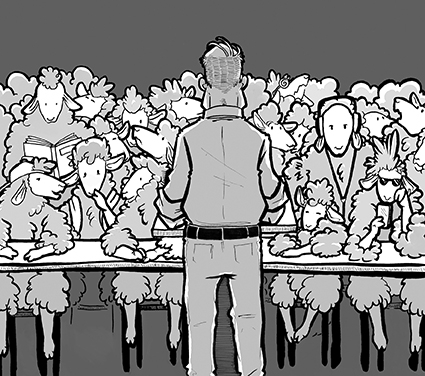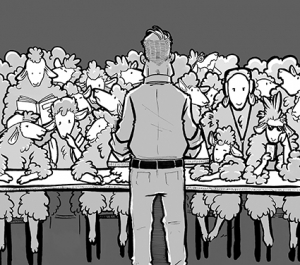Time to Grow Up: Ogden on the Apathy of the Georgian Student
Over the last year, the government has spent a significant amount of time and energy on its education reforms, rightly perceiving this to be an area in which Georgia lags behind the European countries it one day hopes to rub shoulders with. Yet while praising the German school system and attempting to copy it, or raising the pitiful salary of teachers by 50 or 100 GEL (wow!) are worthy endeavors, they have nothing to do with the base problem that plagues every Georgian educational institution from Kakheti to the Black Sea.
I refer, of course, to the Georgian student, whose appalling behavior is so at odds with the extreme sense of entitlement. I can’t speak for Georgian schools, but I’ve seen the state of things at Georgian universities…and it is very worrying.
In Britain (and I suppose the USA to some extent), going to university is not just about earning a diploma; it is a rite of passage, the time when eighteen-year olds leave home and make the gradual transition from child to adult. Their parents are no longer responsible for kicking them out of bed in the morning and sending them off to their lessons, nor preparing their meals, nor cleaning their clothes; some flounder initially, and let this newfound freedom go to their heads, but eventually they simmer down…or leave university.
Yet by the time they get to Master’s degree level, they are young adults, inexperienced in life (for the most part) but past the stage when staying up all hours of the night is exciting and nobody can reprimand them for their drinking. They have chosen to take a Master’s degree; at this stage, they know exactly what university entails and are inclined to take their course seriously…after all, they have chosen to do it, and while a BA is almost obligatory in the modern world, pursuing an MA is still something of a higher calling.
I should also mention that on the first day of any university course in Britain, students are severely warned about cheating and attempts at plagiarism. The penalties are extremely harsh, in most cases resulting in immediate ejection from the university.
Compare that with Georgia, where cheating is an accepted practice. One young BA student copied his essay from Wikipedia; all his teacher told him was not to do it again, and that Wikipedia was hardly the best source since it is often unreliable. Hardly a stern reprimand, you’ll agree. Up at MA level at a prestigious international institution, students routinely plagiarize work and are then shocked when their grades are consequently reduced; most of those who cheat are repeat offenders.
Students also gain percentage points simply for attending classes, and while it is hardly difficult to sit through an hour’s lecture and feign attention, Georgian students still attempt to write the names of their friends on the register lists. This sort of apathy might be pathetic, but it is even more astounding when Georgian students are given their grades at the end of the semester and feel entitled to go to their lecturers and insist they deserve more points; this would simply be unthinkable in Britain. What, a student trying to suggest that their instructor doesn’t know best? In addition, talking in classes and sitting on mobile phones might happen in Britain when the students are teenagers, but not when they are 24.
A few years ago, a Georgian MA student from an international institution won a PhD scholarship to an Ivy League university in the United States; the institute, naturally, was very proud, at least until a few months later when it was revealed that this student had attempted to cheat on his first exam. I’m not sure what anti-cheating measures the Americans take, but I doubt they’re overly different to ours, and it isn’t surprising that this Georgian was unable to do what had obviously worked so well for him at home.
It is hard to take people seriously who are halfway to 30 but act as if they are 11, and it is especially frightening since many students from some international institutions in Georgia go on to secure good jobs. The real tragedy is for those who truly do work and try hard who have their achievements devalued by their fellow students.
The issue here is not educational, but cultural, and will take a different approach to solve, beyond throwing money and plans at the Ministry of Education. Respect and discipline do not come naturally to young Georgians (the males more than the females), but this issue will not be solved until the government is able (or willing) to identify the problem.
Tim Ogden
Illustration by Dan Cordero/theswcsun.com












